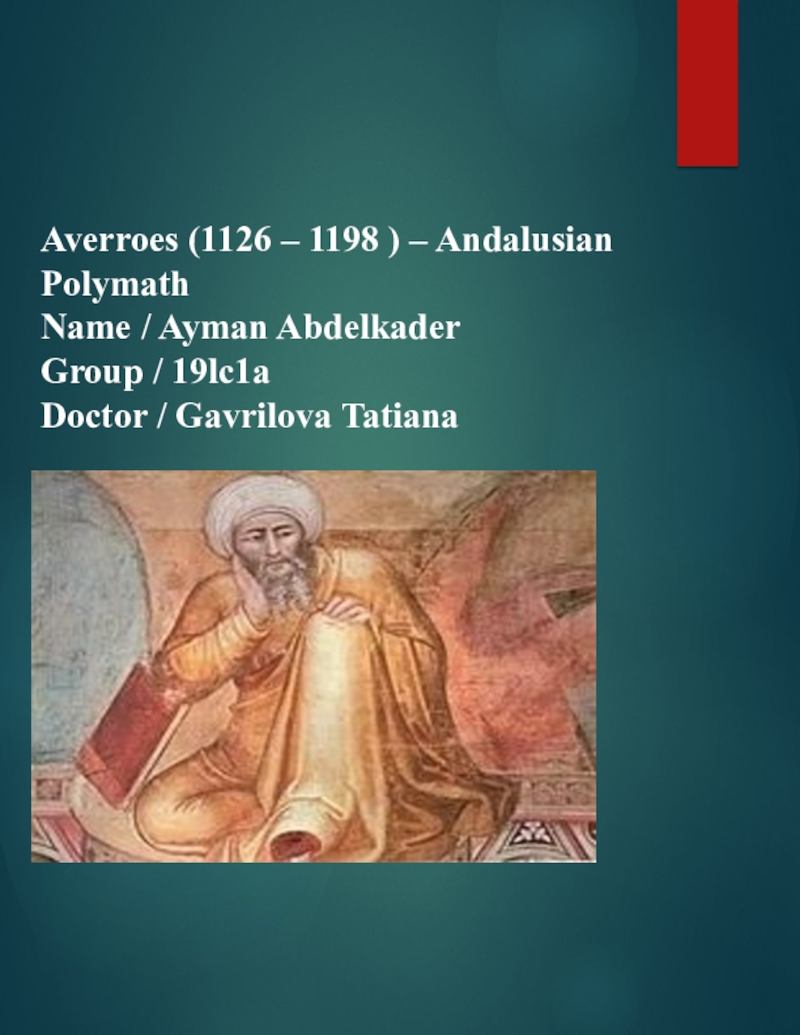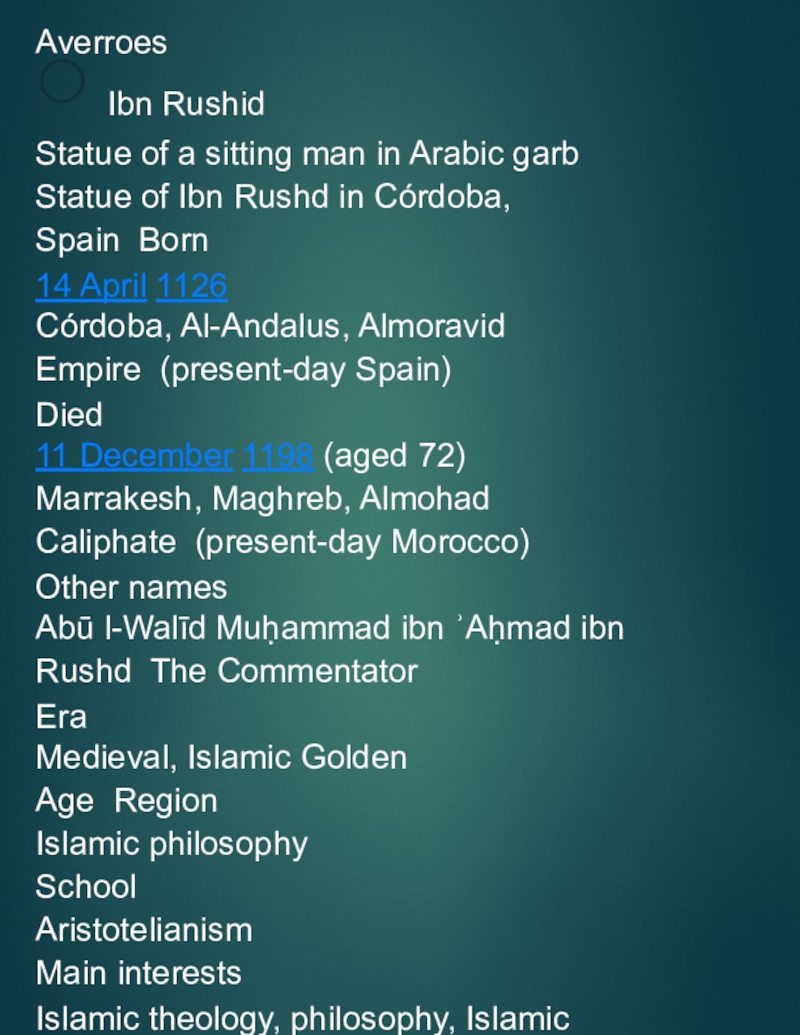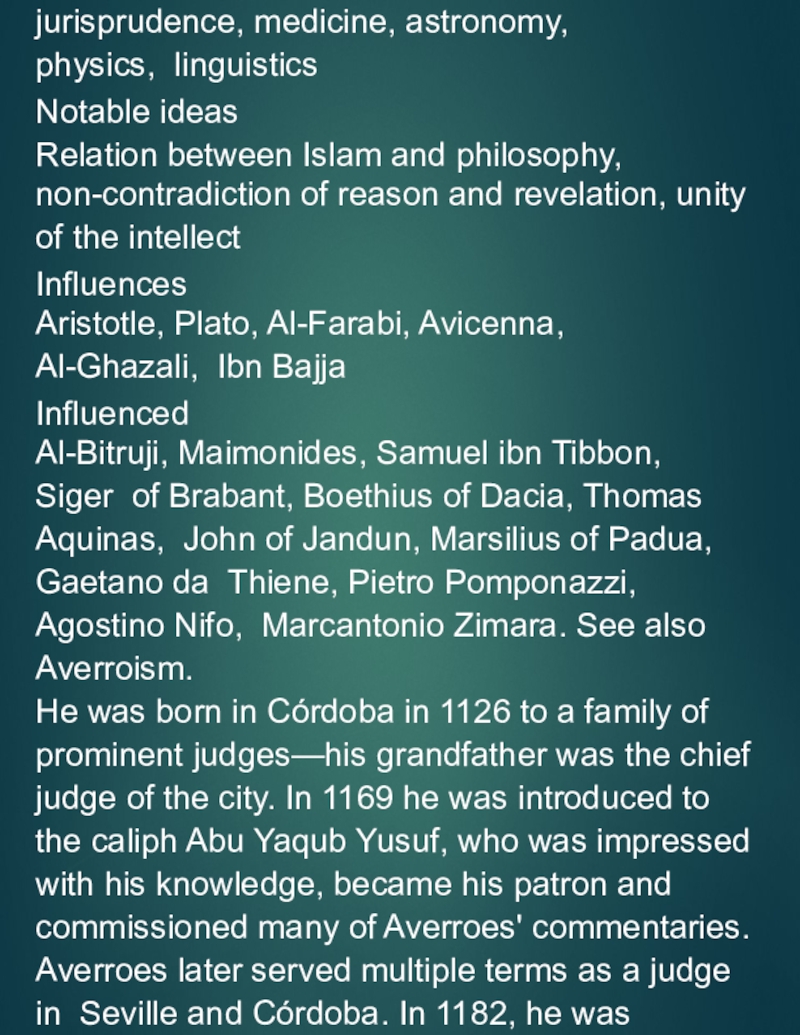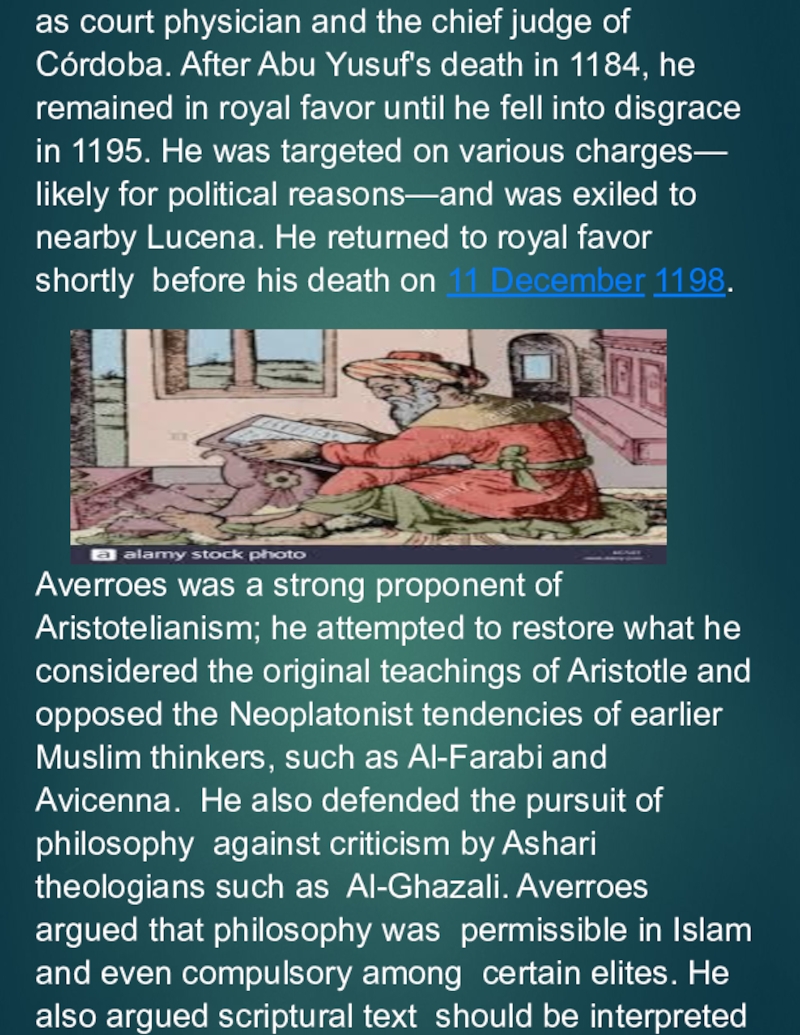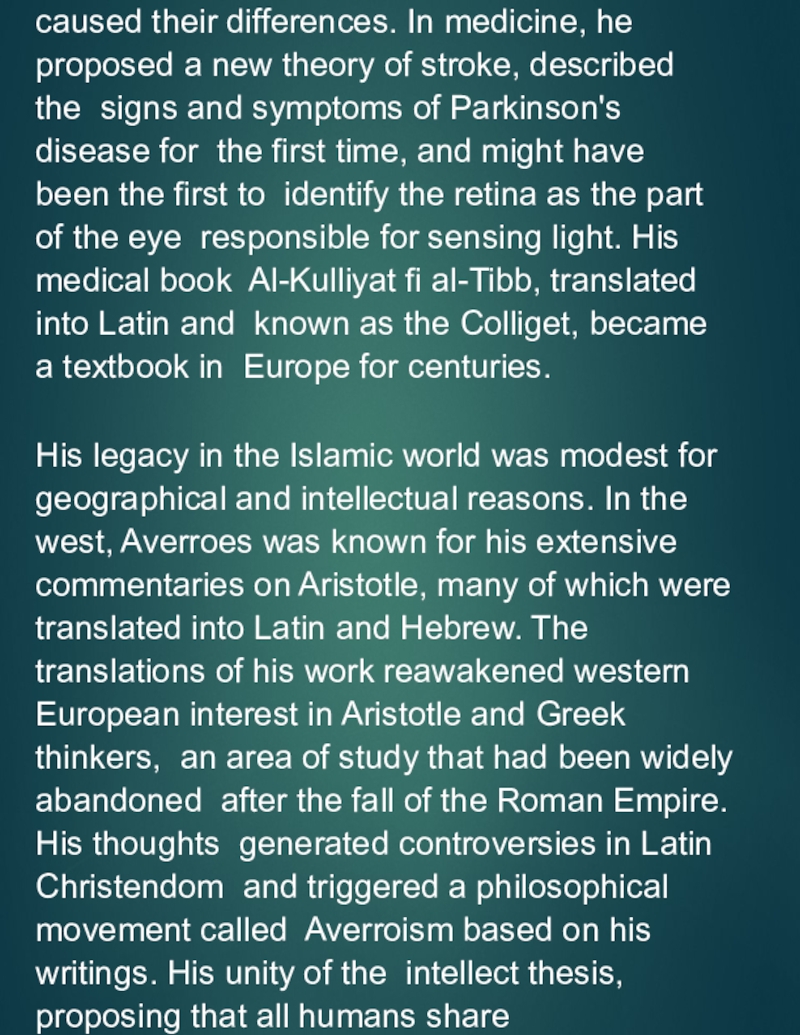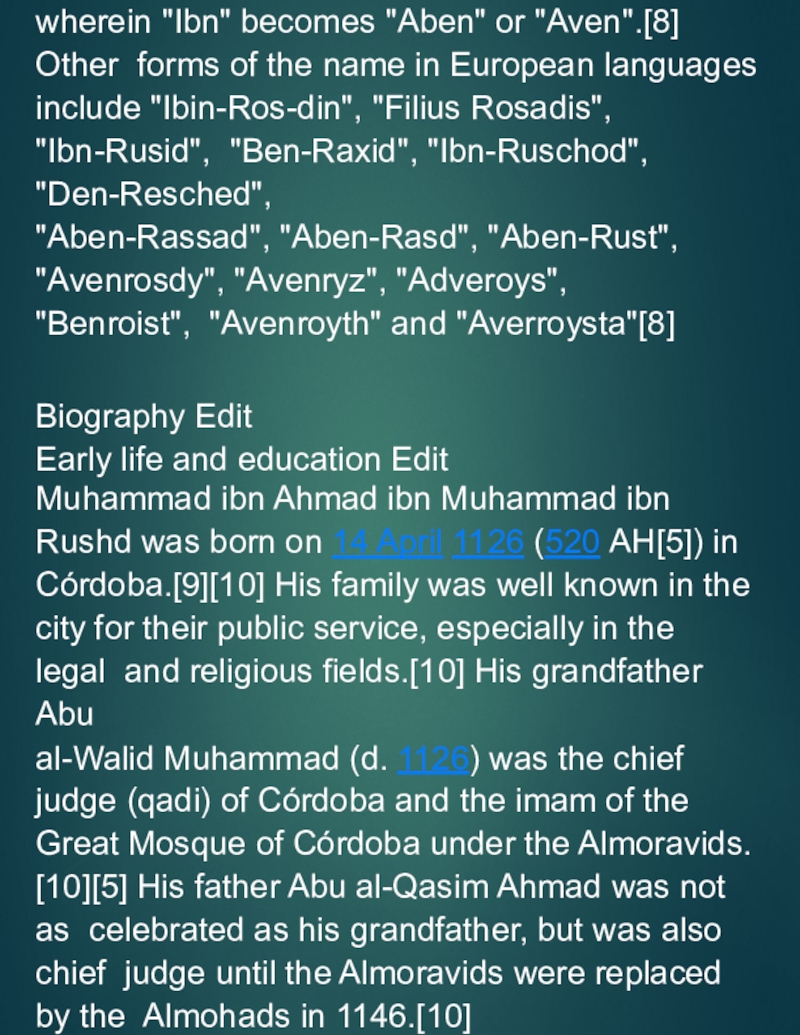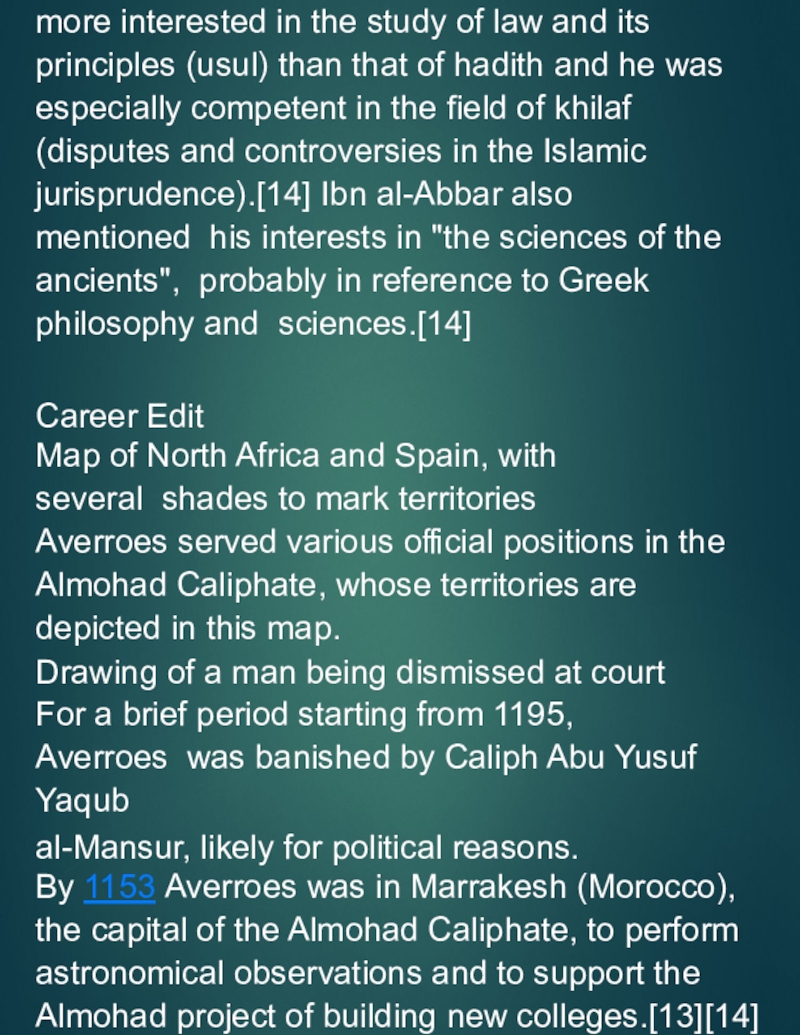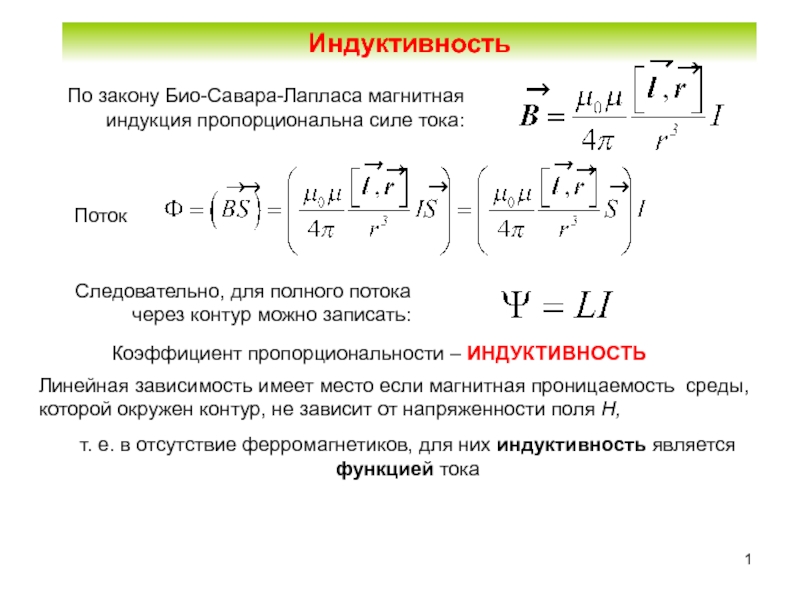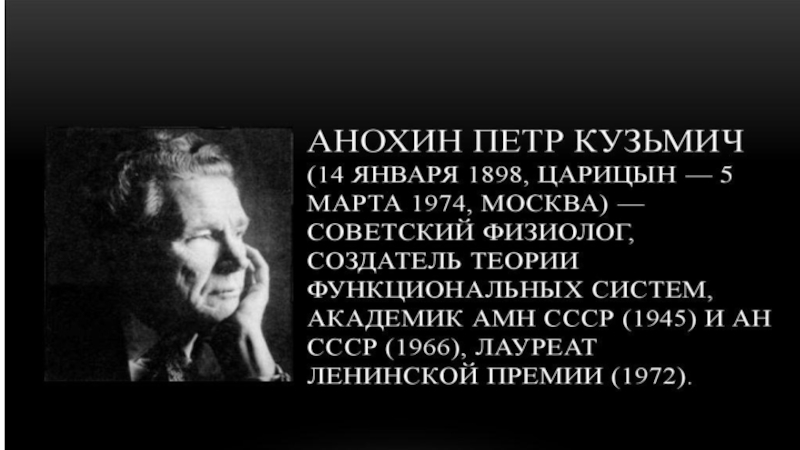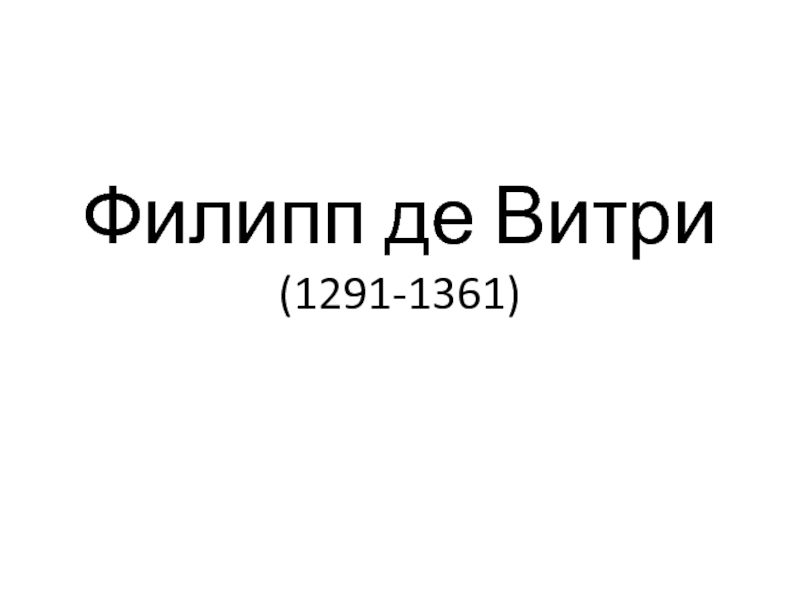Разделы презентаций
- Разное
- Английский язык
- Астрономия
- Алгебра
- Биология
- География
- Геометрия
- Детские презентации
- Информатика
- История
- Литература
- Математика
- Медицина
- Менеджмент
- Музыка
- МХК
- Немецкий язык
- ОБЖ
- Обществознание
- Окружающий мир
- Педагогика
- Русский язык
- Технология
- Физика
- Философия
- Химия
- Шаблоны, картинки для презентаций
- Экология
- Экономика
- Юриспруденция
Averroes (1126 – 1198 ) – Andalusian Polymath Name / Ayman Abdelkader Group /
Содержание
- 1. Averroes (1126 – 1198 ) – Andalusian Polymath Name / Ayman Abdelkader Group /
- 2. The Commentator" redirects here. For thecenter-right website
- 3. Слайд 3
- 4. AverroesIbn RushidStatue of a sitting man in
- 5. jurisprudence, medicine, astronomy, physics, linguisticsNotable ideasRelation between
- 6. as court physician and the chief judge
- 7. caused their differences. In medicine, he proposed
- 8. the same intellect, became one of the
- 9. wherein "Ibn" becomes "Aben" or "Aven".[8] Other
- 10. According to his traditional biographers, Averroes' education
- 11. more interested in the study of law
- 12. Слайд 12
- 13. Скачать презентанцию
The Commentator" redirects here. For thecenter-right website of the same name, see Robin Shepherd § The Commentator. For other uses, see Commentator (disambiguation).Ibn Rushd (Arabic: ; full name in Arabic ,
Слайды и текст этой презентации
Слайд 2The Commentator" redirects here. For the
center-right website of the same
name, see Robin Shepherd § The Commentator. For other uses,
see Commentator (disambiguation).Ibn Rushd (Arabic: ; full name in Arabic , romanized: Abū l-Walīd Muḥammad Ibn ʾAḥmad Ibn Rušd; 14 April 1126 – 11 December 1198), often Latinized as Averroes (English pronunciation: /əˈvɛroʊiːz/), was a Muslim Andalusian[1] polymath and jurist who wrote about many subjects, including philosophy, theology, medicine, astronomy, physics, psychology, mathematics, Islamic jurisprudence and law, and linguistics. The author of more than 100 books and treatises,[2][3] his philosophical works include numerous commentaries on Aristotle, for which he was known in the west as The Commentator and Father of rationalism.[4] Ibn Rushd also served as a chief judge and a court physician for the Almohad Caliphate.
Слайд 4Averroes
Ibn Rushid
Statue of a sitting man in Arabic garb Statue
of Ibn Rushd in Córdoba, Spain Born
14 April 1126
Córdoba, Al-Andalus,
Almoravid Empire (present-day Spain)Died
11 December 1198 (aged 72) Marrakesh, Maghreb, Almohad Caliphate (present-day Morocco)
Other names
Abū l-Walīd Muḥammad ibn ʾAḥmad ibn Rushd The Commentator
Era
Medieval, Islamic Golden Age Region
Islamic philosophy School Aristotelianism Main interests
Islamic theology, philosophy, Islamic
Слайд 5jurisprudence, medicine, astronomy, physics, linguistics
Notable ideas
Relation between Islam and philosophy,
non-contradiction
of reason and revelation, unity of the intellect
Influences
Aristotle, Plato, Al-Farabi,
Avicenna, Al-Ghazali, Ibn BajjaInfluenced
Al-Bitruji, Maimonides, Samuel ibn Tibbon, Siger of Brabant, Boethius of Dacia, Thomas Aquinas, John of Jandun, Marsilius of Padua, Gaetano da Thiene, Pietro Pomponazzi, Agostino Nifo, Marcantonio Zimara. See also Averroism.
He was born in Córdoba in 1126 to a family of prominent judges—his grandfather was the chief judge of the city. In 1169 he was introduced to the caliph Abu Yaqub Yusuf, who was impressed with his knowledge, became his patron and commissioned many of Averroes' commentaries. Averroes later served multiple terms as a judge in Seville and Córdoba. In 1182, he was appointed
Слайд 6as court physician and the chief judge of Córdoba. After
Abu Yusuf's death in 1184, he remained in royal favor
until he fell into disgrace in 1195. He was targeted on various charges— likely for political reasons—and was exiled to nearby Lucena. He returned to royal favor shortly before his death on 11 December 1198.Averroes was a strong proponent of Aristotelianism; he attempted to restore what he considered the original teachings of Aristotle and opposed the Neoplatonist tendencies of earlier Muslim thinkers, such as Al-Farabi and Avicenna. He also defended the pursuit of philosophy against criticism by Ashari theologians such as Al-Ghazali. Averroes argued that philosophy was permissible in Islam and even compulsory among certain elites. He also argued scriptural text should be interpreted allegorically if it appeared to contradict conclusions reached by reason and philosophy. In Islamic jurisprudence, he wrote the Bidāyat al-Mujtahid on the differences between Islamic schools of law and the principles that
Слайд 7caused their differences. In medicine, he proposed a new theory
of stroke, described the signs and symptoms of Parkinson's disease
for the first time, and might have been the first to identify the retina as the part of the eye responsible for sensing light. His medical book Al-Kulliyat fi al-Tibb, translated into Latin and known as the Colliget, became a textbook in Europe for centuries.His legacy in the Islamic world was modest for geographical and intellectual reasons. In the west, Averroes was known for his extensive commentaries on Aristotle, many of which were translated into Latin and Hebrew. The translations of his work reawakened western European interest in Aristotle and Greek thinkers, an area of study that had been widely abandoned after the fall of the Roman Empire. His thoughts generated controversies in Latin Christendom and triggered a philosophical movement called Averroism based on his writings. His unity of the intellect thesis, proposing that all humans share
Слайд 8the same intellect, became one of the most
well-known and controversial
Averroist doctrines in the west. His works were condemned by
the Catholic Church in 1270 and 1277. Although weakened by condemnations and sustained critique from Thomas Aquinas, Latin Averroism continued to attract followers up to the sixteenth century.NameEdit
Drawing of a bearded man in Arabic garb Averroes in a 14th-century painting by Andrea di Bonaiuto
See also: Latinization of names
Ibn Rushd's full, transliterated Arabic name is "Abū l-Walīd Muḥammad ibn ʾAḥmad Ibn Rushd". [5][6] Sometimes, the nickname al-Hafid ("The Grandson") is appended to his name, to distinguish him from his similarly-named grandfather, a famous judge and jurist.[7] "Averroes" is the Medieval Latin form of "Ibn Rushd"; it was derived from the Spanish pronunciation of the original Arabic name,
Слайд 9wherein "Ibn" becomes "Aben" or "Aven".[8] Other forms of the
name in European languages include "Ibin-Ros-din", "Filius Rosadis", "Ibn-Rusid", "Ben-Raxid",
"Ibn-Ruschod", "Den-Resched","Aben-Rassad", "Aben-Rasd", "Aben-Rust", "Avenrosdy", "Avenryz", "Adveroys", "Benroist", "Avenroyth" and "Averroysta"[8]
Biography Edit
Early life and education Edit
Muhammad ibn Ahmad ibn Muhammad ibn Rushd was born on 14 April 1126 (520 AH[5]) in Córdoba.[9][10] His family was well known in the city for their public service, especially in the legal and religious fields.[10] His grandfather Abu
al-Walid Muhammad (d. 1126) was the chief judge (qadi) of Córdoba and the imam of the Great Mosque of Córdoba under the Almoravids. [10][5] His father Abu al-Qasim Ahmad was not as celebrated as his grandfather, but was also chief judge until the Almoravids were replaced by the Almohads in 1146.[10]
Слайд 10According to his traditional biographers, Averroes' education was "excellent",[5] beginning
with studies in hadith (traditions of Prophet Muhammad), fiqh (jurisprudence),
medicine and theology. He learned Maliki jurisprudence under al-Hafiz Abu Muhammad ibn Rizq and hadith with Ibn Bashkuwal, a student of his grandfather.[5][11] His father also taught him about jurisprudence, including on Imam Malik's magnum opus the Muwatta, which Averroes went on to memorize.[12][13] He studied medicine under Abu Jafar Jarim al-Tajail, who probably taught him philosophy too.[14] He also knew the works of the philosopher Ibn Bajjah (also known as Avempace), and might have known him personally or been tutored by him.[10]
[11] He joined a regular meeting of philosophers, physicians and poets in Seville which was attended by philosophers Ibn Tufayl and Ibn Zuhr as well as the future caliph Abu Yusuf Yaqub.[13] He also studied the kalam theology of the Ashari school, which he criticized later in life.[14] His 13th century biographer Ibn al-Abbar said he was
Слайд 11more interested in the study of law and its principles
(usul) than that of hadith and he was especially competent
in the field of khilaf (disputes and controversies in the Islamic jurisprudence).[14] Ibn al-Abbar also mentioned his interests in "the sciences of the ancients", probably in reference to Greek philosophy and sciences.[14]Career Edit
Map of North Africa and Spain, with several shades to mark territories
Averroes served various official positions in the Almohad Caliphate, whose territories are depicted in this map.
Drawing of a man being dismissed at court For a brief period starting from 1195, Averroes was banished by Caliph Abu Yusuf Yaqub
al-Mansur, likely for political reasons.
By 1153 Averroes was in Marrakesh (Morocco), the capital of the Almohad Caliphate, to perform astronomical observations and to support the Almohad project of building new colleges.[13][14] He was hoping to find physical laws
